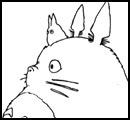On the edge of the sump lives Doctor Sanada (Takashi Shimura), an alcoholic--seemingly all of the men in the film are--who cares more for his patients than they deserve. The surprising central relationship in the film is that of Sanada and Matsunaga (Toshiro Mifune), his patient. Multiple scenes in which they meet end in fisticuffs, all because Matsunaga insists on living an untenable lifestyle.
Kurosawa has strong disdain for the insidious world of organized crime, of which Matsunaga is a part. It would be one thing if it remained self-contained. Tragically for Sanada, this is impossible. His scruples as a doctor require him to care for Matsunaga. Even worse, the girl he looks after is falling into this wrong crowd. (In a heartbreaking, unspoken grace note, Sanada's ward is presumably an orphan from the war.)
Every element of the movie seems to be weighted with more than a superficial importance. A Japanese historian could say exactly what each motif and character symbolize. As it is, one thing is more obvious/worth mentioning: Toshiro Mifune's Matsunaga as a potent stand-in for WWII-era Japan. He is a yakuza in a world that, in its tenuous grasp for basic sustenance, doesn't have a place for him. He refuses to listen to reason, even--and especially--when it leads to certain death.


No comments:
Post a Comment